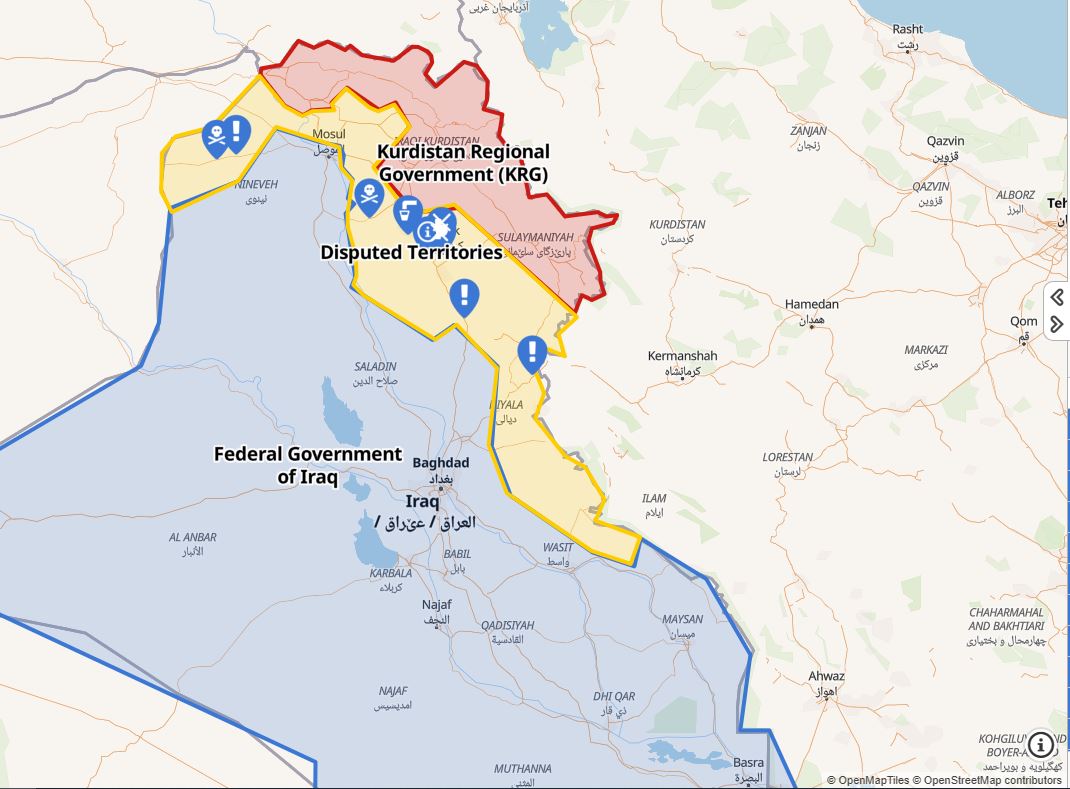1.3K
A weekly brief of events and news occurred in the disputed territories.
Kirkuk
- Kirkuk police spokesman Amer Shwani told local media that the procedures for handing the security file to the local police are ongoing. He added that the Kirkuk police are “happy” to take charge and “previous years prove the ability of the police forces.” The new Iraqi government vowed to end the military ruling in the provinces and grant the local police complete control of the security issues. Since October 16, 2017, the Iraqi government has imposed martial laws in the disputed territories, deploying unnecessary forces to the Kurdish neighborhoods and committing them, including last week.
- On January 4, hundreds of volunteer teachers demonstrated in front of the Kirkuk’s Education Department, demanding employment by contract. The demonstration comes after the Kirkuk education department refused to include volunteer teachers in the recruitment openings. Moreover, on January 8, protesters gathered again, announcing a strike and blocking the department’s main entrance. Furthermore, on January 6, after Friday prayers at the Shoraw Mosque, worshipers held a rally in front of the mosque against the lack of electricity. The mosque’s Imam, who led the demonstration, told the media that the residents of Shoraw, Gurgachal, and Sekanyan have been without electricity for 20 days. “What this government is doing is the utmost injustice,” said the Imam.
- On January 8, the Integrity Commission launched investigations against several health department officials. The investigations after health workers complained about corruption in the distribution of land. According to a statement issued by the Integrity Commission, 500 plots of land have been distributed only to physicians, not other ranks in the department. Separately, the Integrity Commission said in a statement that it arrested the head of the electricity department of Yaichi district while accepting a bribe. The statement read that the incident took place on January 9, when the official extorted money from the farmer to supply electricity to their farms. After being arrested, he confessed to the crime.
- According to statistics of the State Organization for Marketing of Oil (SOMO), in 2022, Kirkuk fields exported 29,456,686 29 million of crude to the Cihan pipeline and Jordan, grossing 2,825,684,925 USD. The number of oil exports from Kirkuk oil fields via the Cihan pipeline is 27,001,513, with revenue of 2,621,752,019 USD. Last year, Jordan exported a total of 2,455,173, earning 2,039,329 USD.
Khanaqin
- On January 7, the Iraqi National Security Agency announced that it had foiled an attempt to smuggle 432,000 liters of gasoline near the Munthiriya border crossing near Khanaqin. According to the statement, the gasoline was in 12 truck tankers, and they attempted to smuggle it by dirt road. Drivers of the tankers have been arrested and sent for investigation. The Iraqi National Security did not clarify where the smuggled gas was heading.
- On January 8, the Iraqi army arrested two Kurdish farmers in their homes who are still missing without knowledge of the arrests. Families of the Kurdish farmers informed authorities, but no one has come to their aid.
Tuz Khurmatu
- On January 11, the Iraqi Interior Ministry announced that security forces had arrested Mohammed Jilan, also known as Obeidullah Sawabi, in the Tuz Khurmatu district. According to the statement, he is one of the “dynamos” of ISIS (Da’esh) movements in Ozem areas and has been closely monitored for two months until he was arrested.
Makhmour
- On January 7, Da’esh terrorists attacked a military checkpoint in the Makhmur district. According to the security media cell, the military checkpoint belongs to the commander of the 14th army division, and after the clashes, the militants fled. The area remains Da’esh’s main hub.
Shingal (Sinjar)
- On January 8, residents of the Siba Sheikh Dra community discovered a mass grave in their neighborhood. The number of the victims in the mass grave was unknown, and the authorities fenced the area. Siba Sheikh Dra residential community is located south of Mount Sinjar, where many Da’esh atrocities were committed against the Yazidi Kurds during the 2014 genocide.
- The German parliament is scheduled to vote on the recognition of the Genocide of the Yazidi Kurds next week. So far, the parliaments of 11 countries have voted on the recognition of the Da’esh genocide against the Yazidi Kurds. Saud Masto, Director General of Yezidi Issues at the Ministry of Religious Affairs, confirmed Germany’s preparation for recognizing the genocide. Siad “About 300,000 Yezidi Kurds in Germany, so the decision of the German parliament is important for us Yezidi Kurds.”

